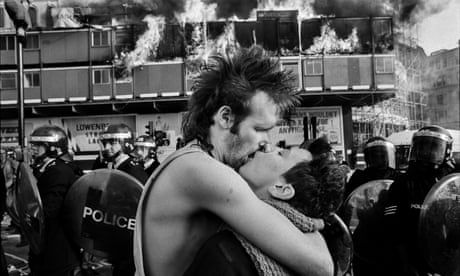
Tate Britain, London
From Greenham and Orgreave to Belfast and City slickers, visceral images from a turbulent decade jostle for attention in a show that feels overwhelming in its scale and confusing narrative
There are several photographs in this exhaustive and exhausting exhibition that could be considered iconic. John Harris’s black-and-white image of a mounted police officer swinging a truncheon at the head of a woman during the miners’ strike is certainly one of them. Another, perhaps not so obvious contender is Paul Graham’s colour photograph of a seemingly ordinary looking traffic roundabout in Belfast, in which you have to look closely to see a British soldier running across the road in the background.
One visceral, the other understated, they both say something about a decade that was marked by social discontent, violence and upheaval. They also denote the changes in photographic practice that occurred during that time: in this instance, the shift from monochrome to colour, from photojournalism to a more detached style of documentary. To a degree, too, they distil the curatorial thrust of this sprawling exhibition, which, as its subtitle suggests, is more about photography’s often conceptually based responses to the 1980s than the turbulent nature of the decade itself. As such, though punctuated with some powerful single images as well as several intriguing series, it makes for a dogged viewing experience that confuses as much as it enlightens.
Continue reading...